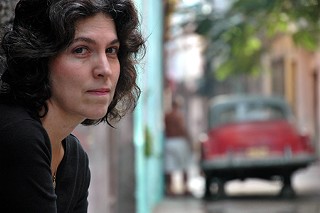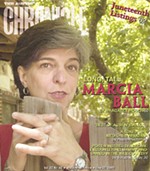Choosing Their Words Carefully
How literary translators shrink the world down to a more manageable size
By Belinda Acosta, Fri., Dec. 31, 2010
It's not unusual if you don't know who Ena Lucía Portela is. It's not surprising if you have no idea that she is a celebrated, award-winning Cuban writer, part of a new wave of Latin American and Caribbean writers whose astringent worldviews distinctly diverge from the magical realism of the Latin American literary boom of the 1970s. That Portela is mostly unknown in the U.S. is expected. Even in a city as literate as Austin, huge gaps remain in our collective knowledge of world-class writers. And it's this obliviousness of the world beyond our borders that the Austin Area Translators and Interpreters Association works to eradicate: one member, one project, one word at a time.
"Globalization has become a one-way street for the most part," said Marian Schwartz, a longtime member of the AATIA who specializes in Russian-English translation. Schwartz is the point person for the AATIA's special event occurring Jan. 8, Uncorking Cuba: One Hundred Bottles, a literary conversation with Achy Obejas, who translated Portela's novel Cien botellas en una pared. (Austin-based Cuban photographer and writer Eduardo Aparicio will interview Obejas onstage, and though the event will be conducted predominantly in English, both English and Spanish versions of the book will be for sale.)
"As the rest of the world is flooded with the American influence, Americans have become increasingly isolated, to the point that we have a very limited ability to appreciate the foreign point of view," Schwartz said via e-mail. "Domestically, the lack of translation leaves us with an entirely unnuanced understanding of immigration issues. Literature in translation is a door to foreign cultures, mindsets, and sensibilities."
Created in the mid-Eighties by three founding members, the AATIA marked its 25th year in 2010 and now has upward of 250 members who translate fiction and nonfiction into and from all the European and Latin American languages, as well as many Asian languages. The Literary Special Interest Group of the AATIA is the core sponsor of Uncorking Cuba, which, besides celebrating the translation of Portela into English, shows a renewed interest in translation by the University of Texas Press, an event co-sponsor and publisher of the English-language One Hundred Bottles (Portela's original Spanish-language version was released in 2002).
"We contacted Achy [Obejas] directly," said UT Press' E. Casey Kittrell, the editor who shepherded translation and production of One Hundred Bottles. Obejas had already translated Portela's "The Last Passenger" for Havana Noir, an anthology of modern crime stories based in Havana. Like Portela, Obejas was born in Havana, but the latter now lives in Chicago. An award-winning journalist, poet, and novelist, Obejas was widely praised for her Spanish translation of Junot Díaz's The Brief Wondrous Life of Oscar Wao. "[She's] a translator of the first order ... a word-alchemist of uncommon gifts and sensitivity," Díaz has said of Obejas.
When I asked Obejas by e-mail if translation work interferes with her own writing, she replied: "My agent asks this question, too. ... I really love translation, the challenge of meaning, and I always have. I see translations as my own work as well, as creative writing in its own right."
While the publication of One Hundred Bottles is not a full-fledged relaunch of UT Press' once-active Texas Pan American Series, it does mark renewed interest in finding and publishing English translations of notable works from around the world.
"Why do I dig it?" Kittrell offered when asked about his role in finding work to translate into English. "I'm not sure exactly, but I do believe literature is important for offering a view of the world from a slightly different angle. In this case, it's fiction with an accent."
Uncorking Cuba: One Hundred Bottles, a literary conversation with translator Achy Obejas, takes place Saturday, Jan. 8, 7pm at the Mexican American Cultural Center (600 River St.). The event is free and open to the public. For more information, see www.aatia.net/blog/sigs/litsig.









